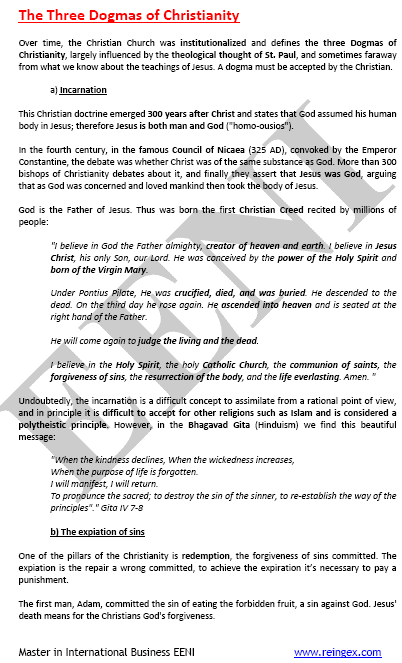Dogmas of Christianity: Incarnation, Trinity
Christian Church, three Dogmas of Christianity, Expiation. Council of Nicaea
Over the time, the Christian Church was institutionalized and defines the three Dogmas of Christianity (Incarnation, Expiation of Sins, Christian Doctrine of Holy Trinity), largely influenced by theological thought of St. Paul.
Christians must accept a dogma.

Religions and Global Business -
Religious diversity
- The three dogmas of Christianity:
- Incarnation
- Expiation of Sins
- Christian Doctrine of Holy Trinity
- Influence of three dogmas on Christian ethics
Dogmas of Christianity

The Subject “Dogmas of Christianity” is part of the following Online Programs (Masters, Doctorate) offered by EENI Global Business School:
Masters: Religions & Business, Business in Africa

Doctorate: Ethics, Religion & Business, African Business.

Why study “Christianity and Business”?.
Languages:  or
or  Cristianismo Dogmas
Cristianismo Dogmas  Christianisme.
Christianisme.
1) Incarnation.
This Christian doctrine emerged 300 years after Christ and stated that God assumed his human body in Jesus. Therefore, Jesus is both Man and God (“homo-ousios”).
In the fourth century, in the famous Council of Nicaea (325 AD), convoked by Emperor Constantine, the debate was whether Christ was of the same substance as God. More than 300 bishops of Christianity debate about it, and finally; they assert that Jesus was God. Thus, was born the first Christian Creed recited by million people.
Undoubtedly, incarnation is a difficult concept to assimilate from a rational point of view, and it is hard to accept for other religions such as Islam (is considered a polytheistic principle). However, in the Bhagavad Gita (Hinduism) we find a similar message.
2) Expiation of sins.
One of the pillars of Christianity is redemption, forgiveness of committed sins. The expiation is the repair a wrong committed, to achieve expiration it is necessary to pay a punishment. Jesus' death means for Christians God's forgiveness.
3) Dogma of the Holy Trinity
The third dogma that every Christian must accept is that while God is only one (monotheism), “God is also three (Christ and Holy Spirit). “God is “Father, Son, and Holy Spirit.” Like the first dogma; it is complex to accept, and was defined at the Council of Nicaea.
This is a dogma that has generated estrangement with other religions. Jews and Muslims consider it a polytheistic principle. Other Christian denominations such as the Unitarian Churches, Jehovah's witnesses or Unitarian Pentecostals are not accepted it. Mormons believe in Trinity but in an entirely different way.
These three dogmas move away to Christianity of many other religions. However, ethical principles of Christianity approach it to others religions.
(c) EENI Global Business School (1995-2025)
Top of this page










 WhatsApp
WhatsApp